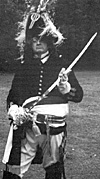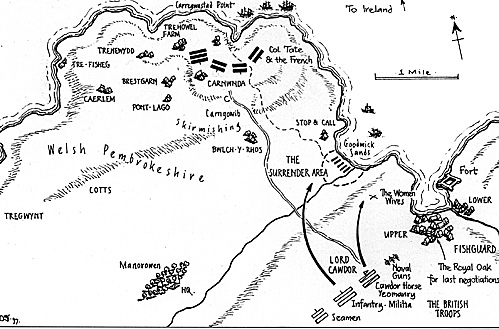Le general de division Louis Lazare Hoche (1768 - 1797)
never actually set foot on Welsh soil on the 22nd of that date -
his main naval. and military forces had intended to land in
Ireland near Bantry Bay (21 - 27 December the earlier year)
but was forced to abandon his Revolutionary invasion (bad
weather never allowed him to meet his ships there), and
escaped back to Brest. However his subordinate, le general
de brigade William Tate (an American officer aged 44) had
made a secondary raid with four French ships against
Fishguard with about 1,250 troops (mostly it must be
admitted from the Parisian jails) a very motley group of two
battalions.
The weather was cold, and French morale was
already low but for two days the enemy looted from a
dozen small Welsh hamlets. Meanwhile Lord Cawdon
and Lt. Colonel John Colby hastily collected the
Pembroke Yeomenry, the Pembrokeshire Militia,
Volunteers and a force of Royal Naval sailors, together
with a few cannon. A little skirmishing followed against
their starving foes. Some of the local people also came
to arms, and, according to the story, the English feared
on the 23rd that the British had received reinforcements -
but these were in fact only several hundred Welsh
women wearing their red shawls and black, long hats to
watch from a hillside. Whether myth or no, Jemima
Nicholas alone rounded up twelve French soldiers with
her pitchfork.
A real battle never developed, for the demoralised French
officers opened negotiations et 'The Royal Oak' publichouse
in Fishguard, and were eventually forced to lay down their
arms for unconditional surrender. William Tate was taken
prisoner, his sword handed to Lord Cawdon near Trehowel
Farm. Perhaps a dozen men had been killed or wounded,
and the rest capitulated - near Goodwick Sands and were
marched away by the Militia inland. Thus ended the last
invasion of Great Britain - and the result was a complete
fiasco for the French. This event was remembered by an
unknown painter, and earlier this year a fine 'tapestry' has
been made bv the ladies of the town.
Several Months ago in 1997, almost 230 members of
the British 'Napoleonic Association' re-enacted the French
surrender on 30 August. Fishguard is holding a whole year of
celebrations to mark the second centenary of the battle, and
the greatest moment came when Lt. Colonel Tom Tate (USA
Army) - the direct descendant of William Tate was honoured
by the town that day. In response his sword was given to
Fishguard Township as a symbol of modern Anglo-American
friendship. In return, the town presented a modern sword
back to the good Lt. Colonel.
Some 70 (real) French reenactors had come to Wales
from Ireland by ferry, and for a reward the Frenchmen were
permitted to 'storm' the Old Fort and Lower Fishguard on the
evening of the 30th as a non historical but tactful victory.
Nevertheless, the town was 'restored' to the British on the
31st. There were only two known casualties - one by a
soldier of the 91 Regiment who overloaded his musket and
was badly bruised on his shoulder for his pains, while le
general Hoche - who wasn't supposed to be present at all -
had his right big toe sadly crushed by his fine boots. These
sad casualties - one English and one for a Frenchman - are
known to have completely recovered!
It has been bought to my attention that, unbeknown to
me, someone has been passing off as D.G. Chandler D. Litt
Oxon on the internet and giving an e-mail number. I wish to
disclaim all involvement and for it to be noted that:
 I suppose
we all know a great deal about say, 'Austerlitz',
'Borodino' and (of course) 'Waterloo', but . I wonder
how much you - even if you should be a Welshman -
know about Fishguard, 22 to 24 February, 1797 - the
very last invasion by sea against Great Britain? I
must confess not to have known much about it, but,
after all, the great Sir John Fortescue's ten volumes
on 'The History of the British Army' (1899 - 1930) has
only written about ten lines on the subject.
I suppose
we all know a great deal about say, 'Austerlitz',
'Borodino' and (of course) 'Waterloo', but . I wonder
how much you - even if you should be a Welshman -
know about Fishguard, 22 to 24 February, 1797 - the
very last invasion by sea against Great Britain? I
must confess not to have known much about it, but,
after all, the great Sir John Fortescue's ten volumes
on 'The History of the British Army' (1899 - 1930) has
only written about ten lines on the subject.
Disclaimer
1) I have never used, nor will use, these forms of
comunication.
2) I am not a member of the Talonsoft
discussion group.
3) I have never writen a letter
commenting on, David Hamilton-Williams' efforts
concerning Talonsofts "Prelude to Waterloo" on 9th
October 1997.

Back to Age of Napoleon No. 24 Table of Contents
Back to Age of Napoleon List of Issues
Back to MagWeb Master List of Magazines
© Copyright 1998 by Partizan Press.
This article appears in MagWeb (Magazine Web) on the Internet World Wide Web.
Other military history articles and gaming articles are available at http://www.magweb.com